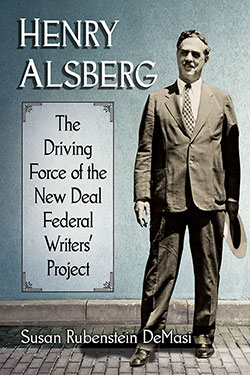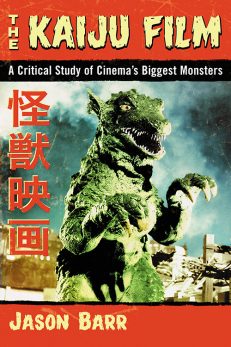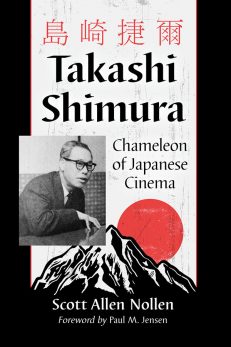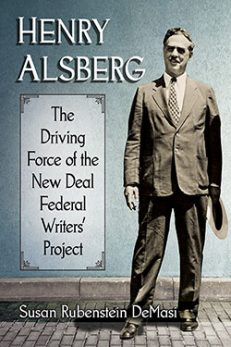Henry Alsberg
The Driving Force of the New Deal Federal Writers’ Project
$29.95
In stock
About the Book
During the Great Depression, Henry Alsberg, a journalist with a passion for social justice, directed the Federal Writers’ Project, a New Deal program of the Works Progress Administration. Under his guidance, thousands of unemployed writers were hired. Despite attacks from the House Committee on Un-American Activities, the Project produced more than 1,000 publications from 1935 to 1939, including the still highly acclaimed American Guide series. Some writers, such as Richard Wright, went on to storied careers. Alsberg led the Project’s collection of more than 10,000 oral histories from ex-slaves, immigrants and others.
Alsberg was also a leader in the struggle to save Jewish pogrom survivors in Eastern Europe. Later, he initiated the first major effort to assist international political prisoners. His friends included anarchist revolutionary Emma Goldman and U.S. Supreme Court Justice Felix Frankfurter. This book brings Alsberg to light as an important but forgotten figure of the 20th century.
About the Author(s)
Bibliographic Details
Susan Rubenstein DeMasi
Format: softcover (6 x 9)
Pages: 296
Bibliographic Info: 20 photos, notes, bibliography, index
Copyright Date: 2016
pISBN: 978-0-7864-9535-1
eISBN: 978-1-4766-2601-7
Imprint: McFarland
Table of Contents
Acknowledgments ix
Preface 1
Introduction 5
1. “The strangely gifted Henry G. Alsberg” 1881–1907 11
2. The Wanderlust of a “Philosophical Anarchist” 1907–1918 28
3. “Our people are suffering in a terrible way” December 1919–May 1920 49
4. Tyranny by Prophets May 1920–August 1921 73
5. At Sea, and at Sea Again September 1921–September 1927 94
6. “The best souls and brains of Russia are being exterminated” 1924–1929 111
7. The Interlude of New York Theater: A “Portentous Possibility” 1924–1929 127
8. “To the daring belongs the world” 1929–1934 143
9. The Man Who Wrote America: The Federal Writers’ Project 1935–1938 156
10. Cultural and Creative Expressions: The FWP’s American Mosaic 1936–1938 180
11. “Naked before his enemies” 1938–1939 199
12. The Radical Lives of Henry Alsberg 1939–1970 223
Epilogue: Lost Treasures 249
Chapter Notes 253
Bibliography 271
Index 279
Book Reviews & Awards
- “Henry Alsberg’s name does not spring immediately to mind when thinking about New Deal administrators, but as director of the Federal Writers’ Project, Alsberg (1881–1979) played a major role in assisting writers and other creative Americans whose livelihoods were destroyed in the Great Depression. DeMasi provides a detailed account of the experiences and talents that prepared Alsberg to take on the challenge. This work on Alsberg is long overdue. Highly recommended”—Choice
- “Thanks to Susan DeMasi for bringing to light the moving story of journalist and human rights advocate Henry Alsberg. His artistic and radical life was an adventure, and her recounting moves along like one”—New Deal Legacy
- “Largely forgotten today, Henry Alsberg is the kind of hero we need to celebrate and the kind of man we need to emulate. Susan Rubenstein DeMasi has brought him back to life for us with her well-crafted biography of this literary savant who doubled as a human rights champion. Flawed and fascinating, Alsberg has met in DeMasi the perfect chronicler of his remarkable journey.”—William F. Schulz, President, Unitarian Universalist Service Committee and former Executive Director of Amnesty International USA
- “The early 20th century was a turbulent time of social change, soaring political hopes and disillusion. There was the beginning of the NAACP, the American Civil Liberties Union and other social justice movements. And there was a man who worked with them all: Henry Alsberg. Susan Rubenstein DeMasi has resurrected Alsberg, entertainingly told his story, and through him, the story of anti–Semitic pogroms, the aspirations and betrayals of Communism, the persecution of dissent in America, and the first organized effort to help political prisoners. I never knew about Henry Alsberg, or his role in these issues. Now I do. And so should you.”—Ira Glasser, Executive Director, American Civil Liberties Union, 1978–2001 (retired).





